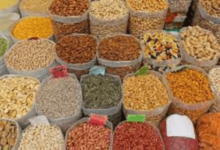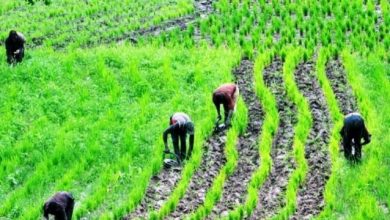11 Steps to Start Tomato Farming Business in Nigeria
You may think that only the northern part of Nigeria grows tomatoes, but I can tell you that tomato farming can be done anywhere in Nigeria.
Here are the steps on how to start your own tomato farming in Nigeria;
👉 Relocate to Canada Today!
Live, Study and Work in Canada. No Payment is Required! Hurry Now click here to Apply >> Immigrate to Canada1. Find A Perfect Site For Your Tomato Farming
The first step you need to take is for you to find a perfect site for you tomatoes farm. Choose a site that is not too far from the market.
Read Also: Top 10 Tomato Producing States in Nigeria

And also there should be an easy transportation access available, in other to have an easy way of transporting your tomatoes when the time comes; after harvesting.
Read Also: 7 Steps to Start Commercial Tomatoes Production in Nigeria
2. Choose A Healthy Land/Soil For Your Tomato Farming
It is important to carefully choose or select a good soil for planting your tomatoes because a good and healthy soil will determine the type of tomatoes that will be produced and the overall productivity of your tomato business.
The soil could be a well-managed sandy loam and heavy clay loams free of hardpan but know that the best tomatoes are obtained from deep, well-drained loam.
Keep in mind that the soil should be rich in organic matter and it should be endowed with plant nutrients, with a pH value of 6 to 7.
In preparing your land; the soil should be well prepared, loose and in good tilt. The soil should be cleared of all weeds and might be ploughed (if heavy) for about 1-3 times to make it light weights. In any case where you have an acidic soil; you can reduce or level it by applying lime in an appropriate quality.
👉 Relocate to Canada Today!
Live, Study and Work in Canada. No Payment is Required! Hurry Now click here to Apply >> Immigrate to Canada3. Choose The Right Tomato Variety
Another good way of getting the best form your tomatoes farming is to plant the right tomato varieties. The different varieties of tomatoes grown in the world generally are;
- Beefsteak tomatoes
- Cherry tomatoes
- Plum tomatoes
- Grapes tomatoes
- Campari tomatoes
- Tom berries tomatoes
- Oxheart tomatoes
- Pear tomatoes
- Slicing or Globe tomatoes
But in Nigeria, the varieties of tomatoes in Nigeria can be classified with their shapes, local names and places of cultivation.
Though if you are confused on which variety to plant, it is recommended that you plant the Roma tomato (which is a plum tomato because of its slender and firm nature). It is commonly used in Nigeria, also popular and has no objection with climate.
Read Also: 6 Problems of Tomatoes Production in Nigeria
4. Plant Your Tomatoes
The best way to plant your tomato is by first planting it in nursery, then later transplanting to the field. Make sure you prepare the nursery bed for a period of about 5 weeks.
This is done by covering them with a polyethylene sheet to prevent weed growth, fungus, nematodes, pests, and bacteria. You should consider applying organic manure and fertilizer before planting. Know that your seedbed should be 55-65cm wide, 5-6cm long and 20-25cm high.
On how to plant your tomatoes; planting your tomatoes can be done around March/April during the beginning of raining season. Plant by placing the tomatoes seeds on the soil and cover with a quarter inch layer of soil and press it with your hand or handle (you may cover it with dry grasses if you want. This is to prevent loss of moisture).
After planting, you will see them growing in the next 5-7days (you can then remove the dry grasses to allow for proper growth) then allow it to grow for about one month and or 5 weeks before transplanting to the field.
Note: Your tomato nursery can be done on a small farm or on your garden; if you have one. Just make sure that the soil is healthy and cared for.
5. Transplant Your Tomatoes (moving your tomato plant to the plant)
After one month or five weeks of planting your tomato in the nursery then you can now freely plant them in the field. Tomatoes are very tender and fragile, it is best transplanted the same day you uprooted it from the nursery to avoid dehydration and fatigue.
You should do the transplanting with hand to prevent damages (do not use any machines for this). If your farm is large, then you should consider employing more labors to assist you in this.
On how to transplant you tomatoes; you should open the soil of where you want to transplant with a piece of small wood, insert the seedling into the hole and cover it with loose soil. The soil where you intend to transplant your plant should be moist.
Note: After transplant, the seedbeds should be irrigated regularly after sowing and until the seedlings reach a height of 5 to 7cm. do not just leave it like that or else, it will die.
Read Also: 8 Varieties and Types of Tomatoes Grown In Nigeria
6. Irrigate Your Tomato Farm
If you want to get the best of your crop; the ensure you supply your plant with enough water. During the dry season (these are the critical times), between the month of October and February, make sure you constantly supply your plant with enough water, like in every 3-7days interval (depending on the type of soil). Know that you should put too much water on it to prevent them from cracking.
7. Weed and Fertilize Tour Tomato Farm
After one to two months of transplanting your tomato from the nursery, you should consider weeding your tomato farm. You should be careful as you weed to prevent damages on your tomato crop.
You can also use chemical weed control, by applying registered chemicals. If you intend to use mechanical method to weed, it should be shallow and not too close to the plant; to prevent damages to the plant.
Fertilizer should be applied after the first weeding. This is to help restock the soil nutrients taken or affected by the weeds. The fertilizer should have contents like nitrogen, phosphorus, potassium, potash, molybdenum, calcium and magnesium, along with other trace minerals, all in adequate quantity. Tomatoes requires these minerals to grow and flourish.
8. Control Pest And Diseases In Your Tomato Farm
Apart from weed control, you should also control your tomato plant from pests. Examples of some tomato pest and diseases are;
- Plusia looper
- Cutworm
- Rust mite
- Red spider mite
- Nematodes
- Aphids
- Leaf miner/potato tuber moth/bacterial wilt
- Fusarium wilt
- Late blight
- Erinose mite
- Bacterial canker
- Thrips
These pests and diseases can controlled by;
- Practicing crop rotation.
- Always destroy infected plants and throw them away from the field.
- Using registered chemicals.
- Practicing of proper sanitation.
- Controlling drainage.
9. Harvest Your Tomatoes
Your tomatoes will mature after 3 months that is about 8-12 weeks. By then, you should start picking them. The color should also tell you that it is ripe. You should pick your ripe tomatoes according to size, color and quality.
Read Also: How Profitable is Tomatoes Farming in Nigeria
10. Store Your Tomatoes
If you are not taking your tomatoes to the market immediately, you may choose to store your tomatoes. Pack your tomatoes in wooden boxes, baskets or cartons. Store them in a room which temperature is about 12oC and 86% to 90% relative humidity.
11. Market Your Tomatoes
After harvesting and storing, then its time to market your tomatoes. Its very important you’ve identified the best market or sellers to sell your tomatoes to because tomatoes are very fragile and perishable.
Unlike rice, cocoa, etc, you cannot store tomato for a long period of time, so the market must be ready, even before you harvest your tomatoes.
This is the end on how to start your own tomato farm in Nigeria. When this steps are practiced accordingly, then you will get a profitable outcome.






